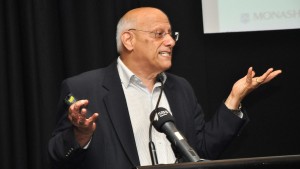Australia in the throes of change – Scanlon survey
Australia is hurtling toward significant generational change with young adults adopting views of nationhood and society markedly at odds with those of their parents, the foremost survey of Australians’ attitudes and opinions has found.
The 2015 Scanlon Monash Social Cohesion Index has seen the strongest positive shift in its history although it is still below the baseline finding of the first survey conducted before the global financial crisis in 2007.
The main findings were: strong support for cultural diversity and migration – and a wide perception that multiculturalism is good for Australia; experiences of discrimination are declining; trust in government is low; and, there is declining satisfaction in social justice and equity with a broad perception that the gap between rich and poor is getting larger.
The report’s author Monash University’s Professor Andre Markus says that Australia is changing in quite a significant way.
“We found that less than 10 per cent of people agree with a selective migration policy based on religion or race. In the 1970s that figure would have been more than 50 per cent,” he said.
Professor Markus said there was growing support – now above 40 per cent – for ethnic minorities to be given government assistance to maintain their cultures and languages.
“Attitudes to immigration are much less volatile than they were. There is greater acceptance that we are an immigrant nation and that it’s good for us,” he said.
The survey, which is aimed at unpacking the balance of opinion in Australia, asked respondents for their view of ‘the most important issue facing Australia today’. In a significant change, the ranking of national security and social issues rose to equal second with the economy remaining first ranked.
The high level of support for the proposition that ‘multiculturalism has been good for Australia’ has been maintained. But there are significant differences in attitudes of young adults, the middle-aged and older Australians, evident in response to questions on national identity and cultural diversity.
Only 35 per cent of respondents aged 18 to 29 agreed strongly that they took pride in Australian culture and way of life compared with 64 per cent of over 60s.
But 41 per cent of the younger group said Australians should do more to learn about other cultures compared with just 16 per cent of the older group.
Significant difference is also evident across Australia’s regions. There is lower support outside capital cities for immigration, resettlement opportunities for asylum seekers and cultural maintenance.
Difference in attitude is also evident in comparison of Australia’s major cities.
Melbourne is by far the most tolerant major city towards Muslims and Sydney the most hostile. But across the nation there is little support for far-right groups opposed to immigration.
The survey found that 93 per cent of respondents have a ‘sense of belonging in Australia’ either to a ‘great extent’ or ‘some extent’.
While sense of belonging ‘to a great extent’ declined from 73 per cent in 2011 to 65-66 per cent in 2013 and 2014, in 2015 it is at 69 per cent.
Ninety-one per cent of respondents agreed with the proposition that ‘in the modern world, maintaining the Australian way of life and culture is important’, and 89 per cent indicated that they took ‘pride in the Australian way of life and culture’.
Since 2009 the surveys have recorded a decline of trust in the federal parliament. In 2009, 48 per cent of respondents indicated that the government in Canberra can be trusted ‘almost always’ or ‘most of the time’, in 2015 a much lower 30 per cent.
“There was an expectation that following the electoral victory of the Coalition government in 2013 there would be significant increase in trust, on the pattern of the increase following the change of government in 2007,” Prof Markus said.
“This expectation was not realised. While in 2015 a lower proportion of respondents indicated that the quality of government is ‘the most important problem’ facing Australia, just 16 per cent consider that the system of government ‘works fine as it is’, 43 per cent that it ‘needs minor change’, 27 per cent ‘major change’, and 11 per cent that it should be replaced,” he said.
Economic issues such as unemployment and poverty were seen as most worrisome along with an increase in concerns around national security and terrorism. There were also high concerns expressed about social issues such as child care, family breakdown and drug use.
Laurie Nowell
AMES Australia Senior Journalist













